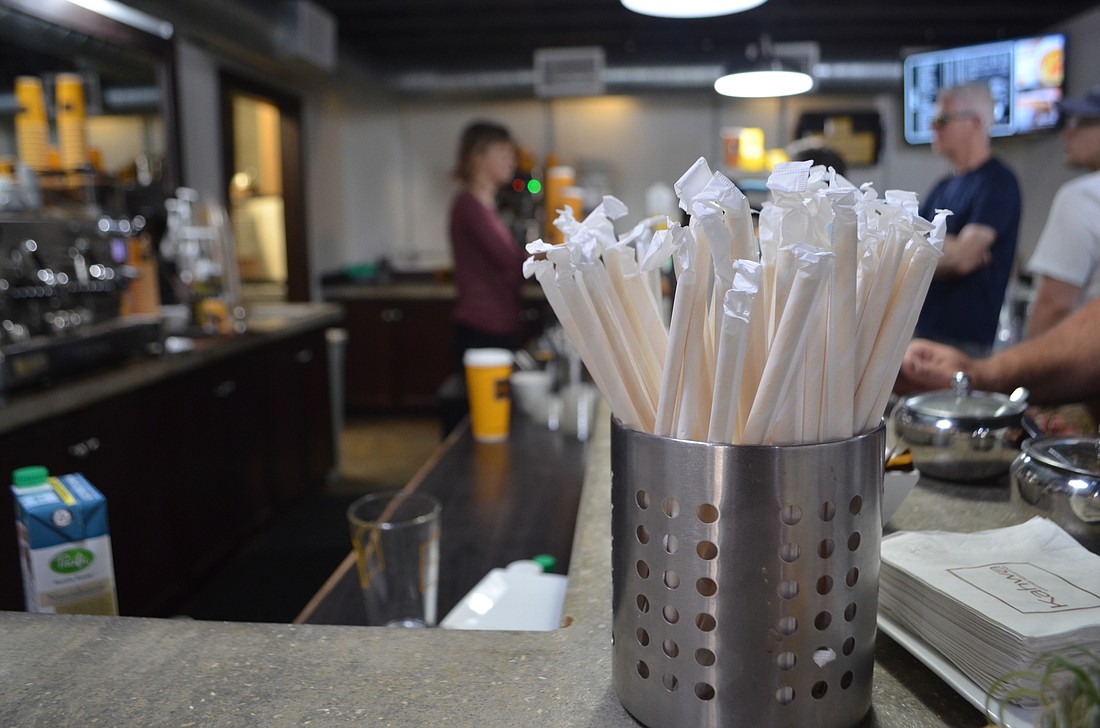- July 17, 2025
-
-
Loading

Loading

Paper or plastic?
For Stevie Freeman-Montes, the answer is ideally “neither.” As the city’s sustainability manager, she wants to discourage a reliance on single-use products, no matter what material they’re made of.
But, as the city joins other municipalities across the country exploring the possibility of regulating some plastic products, she says some materials are worse than others.
For proof, Freeman-Montes points to local shores. The group Keep Sarasota County Beautiful has tracked the types of waste volunteers collect during its International Coastal Cleanup events. In the past five years, the group has found 6,192 plastic bags, 6,649 plastic straws and stirrers and 11,385 foam products and pieces.
She cited a Mote Marine Laboratory study, which examined 142 dead washback loggerhead turtle hatchlings in 2015. Necropsies showed 72% of the hatchlings had synthetic debris in their digestive tracts.
That’s why, as the commission asked staff to look into the city’s ability to limit the use of certain materials, Freeman-Montes has focused on plastic and polystyrene. At the Feb. 4 commission meeting, she shared information on how other Florida cities are regulating plastic bags, plastic straws and polystyrene products.
Freeman-Montes recommended starting with consideration of a prohibition of polystyrene and plastic straws on property the city controls. That could include city-owned properties with lessees, sidewalk cafés and special events held on public property.
The board unanimously directed Freeman-Montes to continue researching and refining a potential ordinance regulating plastics in the city. But the commission also asked questions about how more stringent regulations might affect some members of the community, particularly business owners and individuals with disabilities.
Staff intends to return to the commission with an update as early as next month. In the meantime, Freeman-Montes is hoping to strike a balance between promoting more environmentally sustainable practices and addressing concerns associated with any new regulations.
“I think we would want to be very flexible and understanding,” Freeman-Montes said.
Before making any changes, Commissioners Shelli Freeland Eddie and Hagen Brody wanted the city to spend more time considering how stronger regulations might affect local businesses and their customers.
Although some biodegradable products are less expensive than plastic alternatives, switching from plastic or polystyrene will generally result in increased expenses, according to information Freeman-Montes presented at the commission meeting. Some paper straws can cost 20 times more per unit than a plastic equivalent.
Both Freeland Eddie and Brody expressed some concern about rising costs for business owners, with Freeland Eddie encouraging staff to consider options for assisting those who wanted to reduce their use of plastics but couldn’t afford to make the move.
Freeland Eddie also asked whether any regulations would disproportionately affect areas with fewer fresh-food options, which are generally lower-income segments of the community.
“I think it’s a great idea to move forward, but I don’t want to do it at the expense of making food more expensive for folks,” Freeland Eddie said.
Freeman-Montes said the city and other environmental groups are working with local businesses to get a better sense of any barriers to reducing the use of non-biodegradable material. The University of Florida Institute of Food and Agricultural Sciences Extension has a plastics reduction working group, which is conducting a survey of businesses in Sarasota on this topic.
Freeman-Montes pointed out the city is not looking to completely regulate the behavior of private businesses, focusing instead on public property. She doesn’t want the city’s efforts to end at regulations, though. Freeman-Montes believes education campaigns can effectively encourage businesses to voluntarily reduce their use of problematic materials.
More than 40 businesses have already endorsed Skip the Straw, a local campaign that seeks to discourage the use of plastic straws. And businesses such as Kawha Coffee have made an internal effort to reduce the amount of waste they produce, prioritizing the use of biodegradable products.
In addition to paper straws, Kawha Regional Manager Devin Borgwardt said the coffee shop uses plastic cups made from recycled corn. The café sells reusable cups and straws, and Borgwardt said the store is diligent about asking customers if their order is for in-house or to-go to avoid excess waste.
“We keep the environment in mind with a lot of what we do,” Borgwardt said.
Freeman-Montes is also scheduled to meet with the city’s Citizens with Disabilities Advisory Board to discuss how any regulations might recognize individuals who rely on the use of straws.
Freeman-Montes knows there are some who are skeptical about the efficacy of programs that target specific small plastic products. Even if all businesses stopped using plastic straws, it would represent just a small reduction in the amount of plastic waste in Sarasota.
She acknowledged that, alone, plastic straws or polystyrene containers aren’t necessarily the biggest environmental problem. But because of state restrictions on what municipalities are allowed to regulate, they are some of the largest sources of waste on which the city can actually take action.
And Freeman-Montes thinks there’s value in doing something to reduce the introduction of plastic waste into the environment, even if foregoing a to-go container doesn’t feel like it will change the world on its own.
“It might not be the perfect solution to move the needle, but that can’t stop us from action,” Freeman-Montes said.